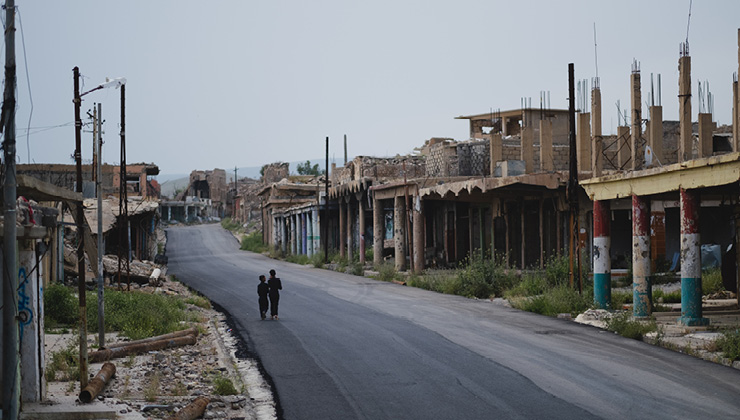“Why isn’t the Security Council called the Peace Council?”
Di Otto
On 14 September 2018, a group of international legal scholars met to discuss a new research project being undertaken at the LSE Centre for Women, Peace and Security. This new project, ‘A Feminist International Law of Peace and Security‘, explores and addresses the conceptual ambiguities and normative indeterminacy that characterises the UN’s WPS agenda, with particular regard to the words – women, peace and security. The aim of the project is ‘to develop the theoretical foundations and normative content of an international law that can more effectively deliver on gender equality and sustainable peace’. Twenty years since the publication of the seminal text the Boundaries of International Law, the project is an opportunity to explore how far feminist approaches have come and how far they need to go to make good on international’s promise of peace and security. The project is funded by the Arts and Humanities Research Council (AHRC).
Contemporary international law (both its fabric and institutions) is founded on the promotion and maintenance of international peace and security. Yet, despite its progressive claims, there is no accepted legal definition of either peace or security in international law. In fact, both concepts are understood variably within different regimes of international law. This ambiguity also extends to the relationship between the concepts notwithstanding the repetitive references to ‘peace and security’ in the law’s language.
In reflecting on the notion of ‘peace’ we ask whether the lack of an international legal definition of peace functions to undermine the progressive peace project of international law. That said, in the context of the WPS Agenda, ‘peace’ is treated as an expansive concept grounded in law and politics that means more than just an ‘absence of violence’; it is a positive state ‘an inclusive political process, a commitment to human rights … and an attempt to deal with issues of justice’ (UN Global Study, 2015). This raises a fundamental question: from a feminist perspective, should legal ambiguity be embraced or rejected? Further, would a gendered rights-based approach resolve this problem?
As part of the working methodology, we are organising a number of workshops and working groups to discuss key concepts such as ‘peace’, ‘feminism’ and ‘gender’ as they relate to and are understood in international legal terms. The first group meeting, held in Manchester on 14 September 2018, resulted in a very fruitful discussion of both feminist methodologies and epistemologies. Participants discussed a list of questions including:
- How useful is it to approach the condition of peace as a world “not without conflict but without violence”? (Reardon, 1993)
- Would a feminist reading of international law provide a more fruitful avenue through which to secure a ‘sustainable peace’?
- How might we to understand what constitutes ‘a feminist international law of peace’?
- What do we mean by conflict? Where is the line between conflict and violence?
- What do we mean by security?
- Where does power come into it?
- Where is power in any concept of peace?
Discussion began with the Declaration on the Right to Peace and its aftermath and how this interacts and intersects with the WPS agenda. Anti-militarism and women’s activism around peace and the environment also played a prominent role in discussions particularly in light of the UN Global Study’s findings. As Christine Chinkin remarked at the European Society of International Law (ESIL) plenary the day before, one of the threads identified by the former Special Rapporteur on Violence against Women, its Causes and Consequences, Radika Coomaswarmy in her report, was the emphasis by women’s groups from across the world on the importance of anti-militarism. Other topics of discussion during the meeting included the relationship of peace to justice, and poverty.
Theoretical approaches to the project also formed an integral part of the conversation. Given the rich development of feminist thought and gender theories within legal scholarship since the publication of Boundaries, the project will explore how feminisms and different theories inform the international law of peace and security. During the discussion one participant remarked that given the gendered nature of international law ‘a feminist peace has to do gender differently’. Another questioned and highlighted the humanist foundations of the international regime, particularly in light of material humanist feminist scholarship.
Finally, the participants considered the challenges of carrying out feminist research including methodological considerations when carrying out field work (bottom up approaches, researches in conflict/post-conflict territories) and alternative legal methodologies.

Undoubtedly, there are many scholars, activists, artists, poets and others working on this very issue from different positions, locations, disciplines and perspectives. We welcome collaborations and conversations and hope this post is a starting point to an on-going dialogue on this topic. For further information on the project, forthcoming workshops and events, see the FILPS page in the Research section of the LSE WPS website. The first public event under this project is on the 13 December 2018 on ‘Women and Weapons’.
This blog was written with the support of an Arts and Humanities Research Council grant called ‘A Feminist International Law on Peace and Security.
The views, thoughts and opinions expressed in this blog post are those of the author(s) only, and do not reflect LSE’s or those of the LSE Centre for Women, Peace and Security.






I read the news with great excitement.
We would also like to be part of your conversation as women from Cyprus, living in a partitioned island. We have worked with Cynthia Cockburn who had helped us two decades ago to create “Hands Across The Divide” and she has written a book about us called “The Line”…
I wish you every success and hope we can also contribute from Cyprus with our own experiences of working together in a divided country as Turkish Cypriot and Greek Cypriot women and women of other ethnicities…